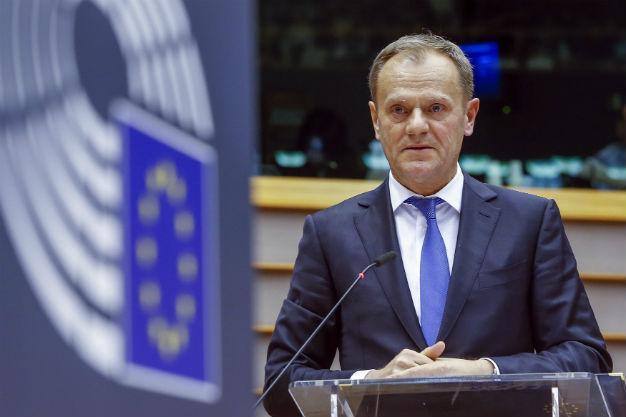EU's Tusk to push Turkey for 'more intense' work on migrants
VIENNA - Agence France-Presse

REUTERS photo
EU president Donald Tusk said on March 1 he would press Ankara for "a more intensive engagement" in the migrant crisis when he meets Turkey's president and prime minister later this week.
"Not for a moment can we stop our efforts to improve the cooperation with our neighbours, starting with Turkey," Tusk said in Vienna at the start of a multi-country tour laying the groundwork for a March 7 EU-Turkey summit on the crisis.
"Europe is ready, as it has already demonstrated, to grant substantial financial support to the countries neighbouring the war-torn regions," he told reporters after meeting Austrian Chancellor Werner Faymann.
"But at the same time we expect a more intensive engagement from our partners as an absolute precondition to avoid a humanitarian disaster. This will be the subject matter of my talks in Turkey this Thursday and Friday," he added.
Tusk was due in Slovenia later on March 1 before visiting Croatia and Macedonia on March 3.
On March 4, he will visit Athens before heading to Ankara to meet Prime Minister Ahmet Davutoğlu. Then on March 5, he will hold talks with President Recep Tayyip Erdoğan in Istanbul, Tusk's office said.
The March 7 summit in Brussels will see Davutoğlu and the leaders of the 28 EU states discuss the progress of last November's EU-Turkey deal aimed at cutting the flow of migrants.
Under that deal, Turkey agreed to tackle people smugglers and improve conditions for Syrian refugees in exchange for three billion euros ($3.2 billion) and a promise from Brussels to speed up Ankara's EU membership bid.
But alarm is growing in EU capitals as thousands of migrants are still reaching the Greek islands from Turkey after more than one million made the perilous journey last year.
Failure to make progress at the summit will spell "disaster" for the bloc, EU migration commissioner Dimitris Avramopoulos said last week, with its passport-free Schengen zone at risk.
Speaking in Vienna, Tusk said EU members had to "fully apply" the Schengen border code and restore effective controls on the EU's external frontier in Greece.
"It's not an easy decision but the truth is there is no alternative to (Schengen)," he said.
"We must face together the humanitarian consequences of our decision. The country which we must support in particular is Greece," he said.
"A test of our European-ness will be, on the one hand, going back to Schengen, and on the other (having) a readiness to stand by Athens during these hard times."
He said he was "opening a new chapter of our struggle with the migration crisis called 'Back to Schengen'."
